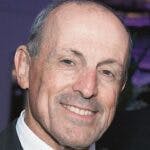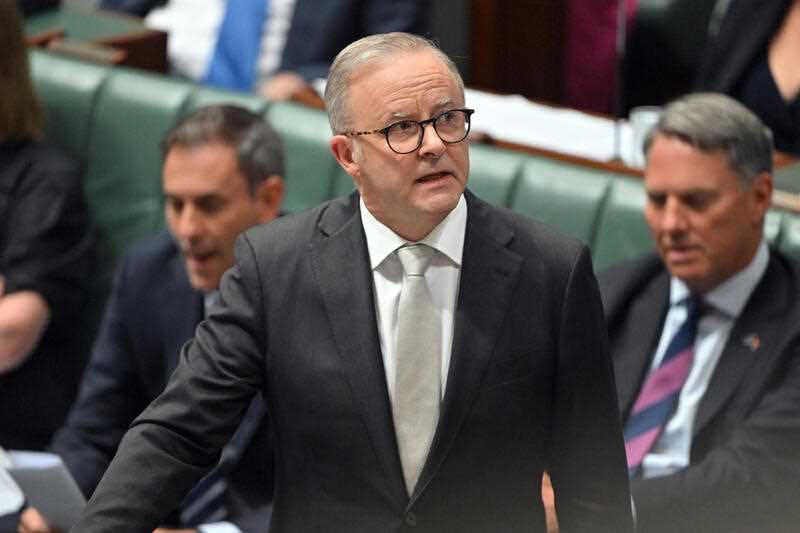Published: 2 February 2024
Last updated: 21 March 2024
VIC ALHADEFF meets TIM ROSSANIS, the driving force behind the initiative that called on Australians to speak out.
Tuesday, November 28, 2023, was a day unprecedented in the annals of Australian Jewry: double-page advertisements in the front of the nation’s major newspapers condemning antisemitism.
“A NEWSPAPER AD CAN’T END HATE,” declared the headline on the advertisement in capital blue letters; “BUT YOU CAN.” In the centre, an inclusive statement denouncing the spike in antisemitism and other forms of bigotry which were, and still are, threatening social cohesion across the nation.
More than 600 men and women from Australian corporate and public life, from a range of faiths and backgrounds, agreed to sign the advertisement, although space limitations meant only about 400 names were printed. But almost 20,000 people signed online variations of the theme.
The impetus for the initiative? The alarming surge in antisemitic incidents across the nation in the aftermath of the barbaric Hamas assault of October 7, generating profound concern across the Jewish community, as well as disquiet at the silence of many of the interfaith leaders with whom the community had been engaging for decades.
The driving force behind the campaign was Tim Rossanis, whose name is little-known within the Jewish community but whose enterprise will be long remembered.
“My hope is that the campaign shone a light on the reality of the experience that thousands of Jewish employees had been having,” reflects Rossanis. “The objective was also to prompt employers to think about what was happening in their workplace and to focus on their human resources policies and how they impacted Jewish employees.
My hope is that the campaign shone a light on the reality of the experience that thousands of Jewish employees had been having.
“Of course, the issues are still there and still vexed, and employers have varying levels of willingness to insert themselves into situations that might be polarising or political or both.”
Rossanis was born in Perth to an Israeli father, Ilan, whose original name was Rozanes, and a Perth-born mother, Loretta. The couple had met at Lucky Divers - a dive shop in the Israeli resort of Eilat where Loretta was working and Ilan was a lifeguard next-door. "My mother always felt a deep connection to Judaism, hence her interest in travelling to Israel." Three months later, they were engaged to be married.

Relocating to Perth, Ilan anglicised his surname to Rossanis, even though there are streets in Israel with the Rozanes name and the family is believed to have part-owned the concourse at the Western Wall – although that could be folklore, Tim hastens to add.
After attending Carmel School in Perth, Tim served as national president of Bnei Akiva and spent a year in Israel on a Bnei Akiva program. In quick succession he spent time in Kenya on a volunteer grassroots program, worked at Flight Centre, moved to New York with his wife and obtained an MBA at Yeshiva University.
“I had exposure to venture capital and tech companies, and that was the pathway which changed the direction of my life – people with chutzpah who don’t think anything is impossible. I wanted to be part of that world. We moved back to Perth, where I got a corporate role at Uber, which brought us to Sydney.
After almost five years there in various leadership roles, I joined Turo as their founding employee in Australia. Turo is the world’s largest car-sharing company, like Airbnb for renting a vehicle. We launched here in November 2022.”
The day after October 7, Rossanis flew to San Francisco on business. “It was very isolating to be on the other side of the world at that moment,” he recalls. “People didn’t understand the stress, the emotion, the anxiety, the impact on one’s well-being. I was open with my Australian colleagues in our Zoom meetings and even broke down at one point.”
On a flight to Perth a short while later, Rossanis “stared out of the window for almost two hours in a Zen-like meditative state, reflecting on how disappointing the business world was in the wake of the massacre and how silent the Australian tech community had been.
“Antisemitism was surging and the ‘Gas the Jews’ incident had just happened. We kept our kids at home and I wasn’t seeing leadership from civil society such as happened during the marriage-equality debate.


“I expressed my thoughts on LinkedIn and got hundreds of messages of support. That’s when the realisation hit me - recognition that thousands of people were thinking and feeling the same as me.”
After agonising over how to translate this new-found awareness into action, Rossanis drafted a letter that business leaders – both Jewish and from wider society - might sign. “The message was that we shouldn’t allow events on the other side of the world to dictate what happens here and that multiculturalism is one of this country’s biggest gifts.”
A three-person WhatsApp consultative group mushroomed as businesspeople and community leaders offered advice and expertise in terms of the content of the proposed advertisements, where they should be published and when. And equally significantly, how wide-ranging the content should be.
The outcome was double-page advertisements in the Australian Financial Review, The Australian, Sydney Morning Herald, The Age, Brisbane Times, Courier Mail, West Australian and others. In addition, billboards were purchased nationally and several newspapers published front-page stories on the campaign.
People saw the language in the ads and the breadth of names, and realised there was no longer a silent hostile majority.
“I’m proud of what we achieved,” says Rossanis. “It provided a momentary sense of relief from the anxiety over what it means to be Jewish at this point in history. People saw the language in the advertisements and the breadth of names who had put their hands up, and realised there was no longer a silent hostile majority. The message was the magic of diversity and that the Jewish community is an indelible part of our multicultural society.
“The bigger impact is that we shone a light on the issue. We used tech know-how and viral marketing tactics to take over social media for a period. The campaign created impetus for conversations at executive level in boardrooms across the country.
“Every employer should be able to create an environment that’s safe for everyone. That’s what the statement was about and what the advertisement was about. It was balanced and inclusive. I’ve been thinking about what’s next.”
Rossanis has started exploring several new projects but says it’s too early to discuss them publicly. “I’m passionate about this issue and am looking to engage a group of like-minded but not homogeneous business and Jewish communities intent on fighting antisemitism. We need to diagnose the scope and magnitude of the problem before we can deal with it further.”





Comments
No comments on this article yet. Be the first to add your thoughts.